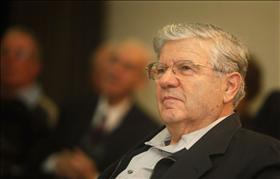A strong precedent for pluralism
Professor Aharon Barak: Israel must civilly recognize non-Orthodox converts as Jewish
While serving as Israeli Supreme Court Chief Justice, Professor Barak argued in favor of recognizing non-Orthodox converts as Jews, a precedent which has paved the way for other positive steps for religious pluralism in Israel.
14/01/2014 13:06
Tags: Aharon Barak · conversion · religious pluralism · Naamat · Chief Rabbinate

Former Supreme Court Chief Justice Aharon Barak at a conference in Jerusalem Picture: Yosi Zamir/ Flash90
Although Former Chief Justice Aharon Barak most recently made headlines with his strong call for freedom of marriage in Israel in his forthcoming book, he is no stranger to adopting legal positions that support freedom of marriage and religious pluralism. In this February 20, 2002 Supreme Court ruling on Naamat et.al. Vs. Minister of the Interior, (on whether or not Israel should civilly recognize non-Orthodox converts as Jews) Justice Barak refuted the notion that the State of Israel consists of one uniform Jewish community under the rule of a centralized Chief Rabbinate.
In this excerpt Professor Barak makes the case for accepting non-Orthodox converts as Jewish citizens by the Ministry of the Interior, as well as recognizing Jewish pluralism as a celebrated reality in Israel, based on the Declaration's Independence mandate for freedom of religion and equality.
Professor Barak wrote:
"The state claims that conversion conducted in Israel is only valid if it receives the confirmation of the Chief Rabbinate, this confirmation is required because in Israel there is only 1 religious Jewish community, headed by the Chief Rabbinate of Israel. Therefore, for residents of the state who wish to register as Jews in the columns of religion and nationality, a conversion certificate that is not recognized by the Chief Rabbinate cannot serve as the basis for registration…"
"This argument on the part of the State I cannot accept. True, the term religious community appears in the legislation of Israel….. but one cannot deduce that all Jews in Israel constitute one religious community, which is headed in the religious sphere by the Chief Rabbinate of Israel….. the perception of Jews in Israel as a “religious community” of the “King’s Order and Council” 1922/1947 is a Mandatory – Colonial attitude. It has no place in the State of Israel."
"Israel is not the State of the “Jewish community” Israel is the state of the Jewish people, and is the expression of “the right of the Jewish people for national revival in its land” (from the Declaration of Independence). Within Judaism there are different streams that operate in Israel and beyond. Each stream operates according to its outlook and views."
"Each and every Jew in Israel – as well as each and every non-Jewish person – is entitled to freedom of religion, conscience and association. Our basic precepts grant each and every individual the liberty to decide on his affiliation with one stream or another…I view the position of the state as an attempt to bring through the back door the requirement for approval of the Chief Rabbinate for conversions performed in Israel…"
Professor Barak's legal opinion is reflective of Israeli public opinion regarding non-Orthodox converts. In the 2013 Religion and State Index, 61% of Israeli Jews said they favor legal recognition of every type of conversion that is currently practiced. This result has been consistent since the first index. Of the 61% in favor, more than one-third (36%) support a secular conversion (Jewish study and a ceremony for joining the Jewish people in a non-religious process), compared to 30% in the past two indices. Similarly, a poll conducted by the Ministry of Diaspora Affairs found that 63% of Israeli Jews view Reform and Conservative converts as Jewish.
Today, both Orthodox and non-Orthodox conversions are recognized for purposes of the Law of Return. This is largely due to Professor Barak's landmark opinion and an additional ruling in which the Supreme Court ordered the government to grant financial support to non-Orthodox conversion seminars. However, due to the Chief Rabbinate's discriminatory polcieis, non-Orthodox conversions are far from receiving recognition for purposes of marriage.
While Professor Barak's legal opinion on recognizing non-Orthodox converts has been partially implemented in the civil realm, Israeli citizens who have chosen to join the Jewish people in a process befitting to their personal values and conscience suffer from the Chief Rabbinate's discriminatory policies and refusal to recognize their Jewish status. Along with hundreds of thousands of Israelis, they still await the opportunity to realize their basic human right to freely marry in the State of Israel. This goal, which is mandated by Israel's Declaration of Independence, will only be achieved when the Chief Rabbinate's Orthodox monopoly on religious affairs in Israel is finally broken.